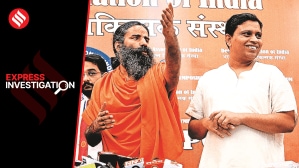Ward committees lack key members as State dallies
CHANDIGARH, June 4: Over nine months have passed since the 12 divisional ward committees, established by the Pune Municipal Corporation (PMC...

CHANDIGARH, June 4: Over nine months have passed since the 12 divisional ward committees, established by the Pune Municipal Corporation (PMC) for decentralisation of administration, came into force. However, the State government is still to frame the norms for nomination of non-political members on these committees.
This, despite the fact that the PMC had issued a reminder to the State government way back in 1995, urging it to frame the norms at the earliest.However, the State had then directed the PMC to go ahead with the formation of the divisional ward committees, sans the nomination of the three non-political members as required under section 29 (A) of the amended Bombay Provincial Municipal Corporation Act.
Following the directives, 12 divisional ward committees were established by the PMC on August 16, 1997. However, each of these committees comprised only of the local corporators, representing the municipal wards attached to the committee, and the ward officer. The chairperson of the committee was elected from among the member corporators.
Following the 74th constitutional amendment – making it mandatory for the corporations to decentralise the civic administration by establishing ward committees, the BPMC Act was amended on December 6, 1994.
Section 29(A) of the Act rules that the ward committees “shall consist” of the councillors (corporators) representing the electoral wards within the territorial area of the ward committee, the officer in charge (divisional ward officer in case of PMC) of the ward committee and such number of other members, not exceeding three, nominated by the councillors.
The Act rules that these three members should be representatives of a recognised Non-Government Organisation (NGO) and community-based organisations engaged in social welfare activities working within the area of the ward committee. Also, they should be persons who are registered as electors in the wards within the jurisdiction of the ward committee.
The Act further states that the norms for recognition of the NGOs, the requisite qualification for nomination as members and the manner in which they are to be nominated shall be prescribed by the State government.
Though over three years have passed since the amendment, the norms have not been framed and the ward committees established by the PMC, Pimpri-Chinchwad Municipal Corporation (PCMC) and by several other corporations in the State are functioning without the advise and expertise of the three nominated non-political members.
Talking to the Indian Express on condition of anonymity, a senior PMC officer said that considering the wide ranging financial and executive powers delegated to the chairpersons of the ward committee, nomination of the three non-political members was essential. Also, as these members would possess knowledge of local issues and civic problems their advice and expertise would help enhance the efficiency of the ward committee, he said.
He, however, felt that the norms for nomination of these members should be stringent enough to ensure that the corporators, who are empowered by the Act to nominate the members, do not use these powers for political rehabilitation of their followers.
“The Pune Municipal Transport (PMT) is already in bad shape and is facing a financial crisis, as over the years the political leaders have nominated their followers on the PMT committee instead of the citizens who possess technical and administrative knowledge to run the transport undertaking,” he said.
Ironically, though the divisional ward committees have come into existence, the PMC subject committees are still to be dissolved. Former municipal commissioner Ramanath Jha had tabled a proposal in April this year recommending the civic body to abolish six civic subject committees.
Like the PMT committee these subject committees too were reduced to `dumping grounds’ for rehabilitation of corporators who were denied important civic posts. The six subject committees which face dissolution include the City Improvement Committee, Slum Improvement Committee, Health Committee, Secondary and Technical School Committee, Sports Committee and Establishment Committee.
The administration had pointed out to the elected members that a divisional ward committee is a statutory body empowered to take executive and financial decisions pertaining to the civic works in the municipal wards in its jurisdiction.
According to the Act the ward committee can grant administrative approval and financial sanction to such civic works costing up to Rs 5 lakh. Taking a step further, the PMC administration has proposed to empower the ward committees to sanction tenders and work orders for public works to the tune of Rs 10 lakh.
The civic general body, the standing committee and two other subject committees – the Law committee and the Woman and Child Welfare committee, would take the major policy decisions concerning the whole city while the local administration would be handled by the ward committees. Hence, there was no need to continue with the six subject committees, the administration argued.
Interestingly, when the elections for these six subject committees were announced this year, not a single nomination was received and the committees were not formed. However, technically they have not been dissolved.
According to sources, the elected members have demanded that the administration provide official cars to chairpersons of the ward committees if the subject committees are to be scrapped.
Photos



- 01
- 02
- 03
- 04
- 05




























